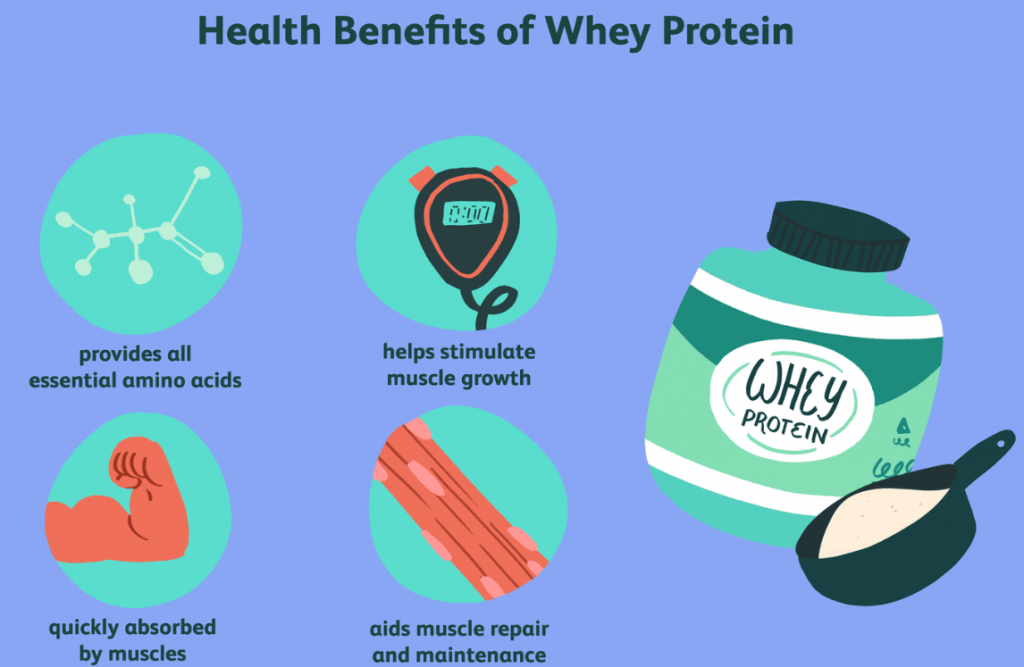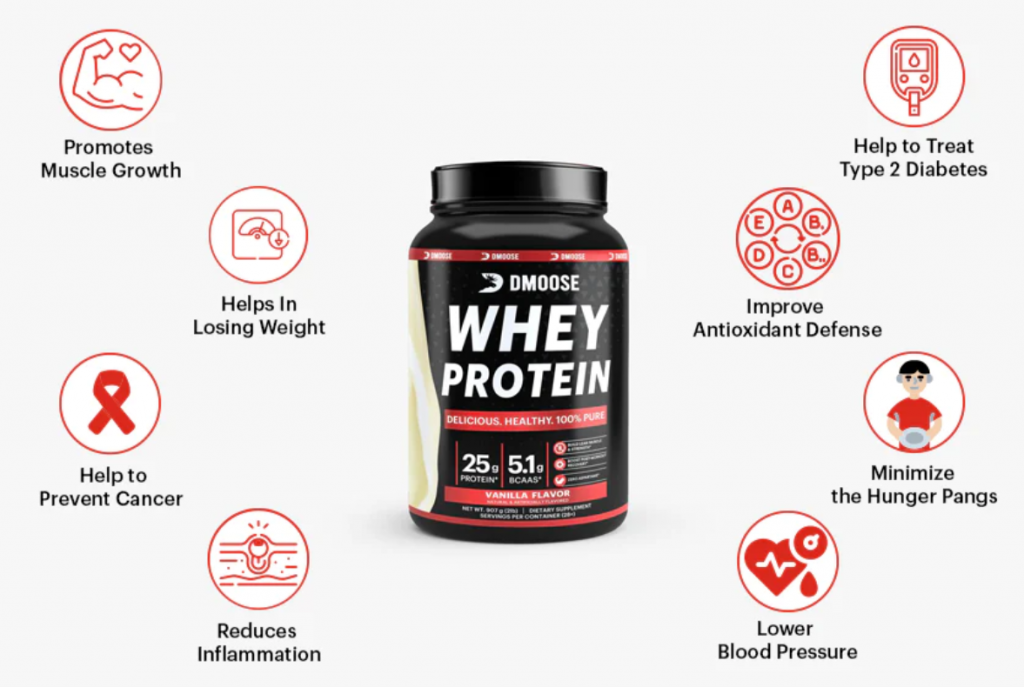
Protein powder is a convenient and versatile dietary supplement that offers several benefits, particularly for individuals with specific fitness goals, dietary preferences, or lifestyle needs. Here are some of the potential benefits of using protein powder:
- Muscle Growth and Repair: Protein is essential for muscle growth and repair. Protein powders provide a concentrated source of protein that can help support muscle recovery and development, making them popular among athletes and those engaging in resistance training.
- Convenience: Protein powder is a convenient way to increase protein intake, especially for individuals with busy lifestyles or limited access to whole food protein sources. It can be easily mixed with water, milk, or other liquids, making it a quick and portable option.
- Aid in Weight Management: Protein is known to promote feelings of fullness and satiety. Including protein powder in your diet can help control appetite, potentially aiding in weight management and preventing overeating.
- Support for Vegetarians and Vegans: Plant-based protein powders offer a valuable protein source for individuals following vegetarian or vegan diets, helping them meet their daily protein needs without relying solely on animal products.
- Post-Workout Recovery: Protein powder is often consumed after workouts to provide the body with the necessary amino acids for repairing muscle tissue damaged during exercise. This can help speed up recovery and reduce muscle soreness.
- Meal Replacement: Protein powder can be used as a meal replacement option for individuals seeking a convenient way to consume nutrients while managing calorie intake. This can be especially useful when whole food options are not readily available.
- Improved Muscle Protein Synthesis: Consuming protein shortly after a workout can stimulate muscle protein synthesis, the process responsible for building new muscle tissue.
- Support for Aging Populations: As individuals age, they may require additional protein to counteract the natural loss of muscle mass. Protein powders can be a way to supplement protein intake and help preserve muscle mass.
- Nutrient Variety: Different protein powders provide various nutrients beyond protein. For example, whey protein offers branched-chain amino acids (BCAAs), while some plant-based options contain fiber, antioxidants, and other beneficial compounds.
- Flexibility in Diet Planning: Protein powders can be incorporated into various recipes, such as smoothies, shakes, oatmeal, and baked goods, offering a way to increase protein content in a variety of dishes.
- Reduced Cooking Time: For those who don’t enjoy cooking or have limited culinary skills, protein powder can be a quick and hassle-free way to boost protein intake.
- Enhanced Immune Function: Protein is crucial for immune system function. Adequate protein intake can support the production of immune cells and antibodies that help defend against infections.
- Blood Sugar Regulation: Protein can help stabilize blood sugar levels and reduce the post-meal spikes in blood sugar that can occur after consuming high-carbohydrate meals.

Here are some of the most frequently asked questions about protein powder:
What is protein powder?
Protein powder is a food supplement that is made from protein. It is typically made from milk, soy, or whey. Protein powder is often used to supplement the diet of people who are trying to gain muscle mass or lose weight.
What are the benefits of protein powder?
Protein powder can provide a number of benefits, including:
- Helping to build and repair muscle tissue
- Promoting weight loss or weight gain
- Improving athletic performance
- Boosting the immune system
- Reducing the risk of chronic diseases
What are the different types of protein powder?
There are many different types of protein powder available, each with its own unique benefits and drawbacks. Some of the most common types of protein powder include:
- Whey protein: Whey protein is the most popular type of protein powder. It is quickly absorbed by the body and is a good source of essential amino acids.
- Casein protein: Casein protein is slower to absorb than whey protein. It is a good source of protein for people who want to feel full for longer.
- Soy protein: Soy protein is a good plant-based protein powder. It is a good source of essential amino acids and is low in fat.
- Pea protein: Pea protein is another good plant-based protein powder. It is a good source of essential amino acids and is gluten-free.
- Hemp protein: Hemp protein is a good source of protein, fiber, and omega-3 fatty acids. It is a good choice for people who are looking for a vegan protein powder.
How much protein powder should I take?
The amount of protein powder you should take depends on your individual needs. The recommended daily intake of protein for adults is 0.8 grams per kilogram of body weight. However, if you are active or trying to gain muscle mass, you may need to consume more protein.
How should I take protein powder?
Protein powder can be taken in a variety of ways. It can be mixed with water, milk, or juice and consumed as a drink. It can also be added to smoothies, oatmeal, or baked goods.
What is the Best Protein Powder Manufacturing Company
Determining the “best” protein powder manufacturing company can be subjective and dependent on various factors, such as product quality, customer reviews, brand reputation, and individual preferences.
- Optimum Nutrition: This brand is widely recognized for its high-quality whey protein products and has a strong presence in the market.
- MuscleTech: MuscleTech is known for its research-driven approach to supplement development and offers a variety of protein powders.
- Dymatize Nutrition: Dymatize is another reputable brand with a range of protein supplements and a focus on quality and innovation.
- MyProtein: MyProtein is a global brand known for offering a wide range of protein powders and other sports nutrition products.
- Isopure: Isopure is known for its whey protein isolate products, which are often favored by those seeking low-carb and high-protein options.
- Transparent Labs: This brand emphasizes transparency and offers protein powders with minimal additives and high protein content.
- Vital Proteins: Vital Proteins is known for its collagen-based protein powders that target joint and skin health.
- Bulk Naturals: Bulk Naturals specializes in offering high-quality, natural protein powders without artificial additives.
Is protein powder safe?
Protein powder is generally safe for most people. However, there are some potential side effects, such as gas, bloating, and diarrhea. If you experience any of these side effects, you should stop taking protein powder and talk to your doctor.
What is the best protein powder?
The best protein powder for you will depend on your individual needs and preferences. Consider your budget, your dietary restrictions, and your taste preferences when choosing a protein powder.
What is protein powder?:
This question seeks a basic definition and understanding of what protein powder is and its purpose.
Why do I need protein powder?:
People often ask about the benefits of using protein powder and when it’s appropriate to incorporate it into their diet.
What are the different types of protein powder?:
This question aims to understand the variety of protein sources available in powder form, such as whey, casein, plant-based, and more.
Which type of protein powder is best for me?:
Individuals often want to know which protein source aligns with their dietary preferences, fitness goals, and any allergies they may have.
What is Top Protein Power Brands in the world
When it comes to finding the right protein powder to support your fitness goals and nutritional needs, resources like ireviewed.in provide valuable insights. This platform delves into the world of protein powder brands, offering reviews and information to help consumers make informed choices.
ireviewed.in has become a go-to source for individuals seeking comprehensive evaluations of various protein powder brands. Through their thorough analysis, they assess factors such as ingredient quality, nutritional profiles, flavors, and effectiveness. By sharing the good information about protein powder brands, they empower consumers to select products that align with their preferences and objectives.
- Optimum Nutrition: This American company is a leading manufacturer of sports nutrition products Protein Power Brands. Optimum Nutrition is known for its high-quality products and innovative formulas.
- Myprotein: This British company is a leading online retailer of sports nutrition products. Myprotein offers a wide variety of protein powders at affordable prices. The company’s products are made with high-quality ingredients and are backed by a satisfaction guarantee.
- Dymatize: This American company is a leading manufacturer of sports nutrition products. Dymatize offers a wide variety of protein powders, including whey protein, casein protein, and vegan protein powders. The company’s products are known for their high quality and affordable prices.
- GNC: This American company is a major retailer of health and wellness products, including protein powders, vitamins, and minerals. GNC offers a wide variety of protein powders to choose from, including whey protein, casein protein, and plant-based protein powders.
- MuscleTech: This American company is a leading manufacturer of sports nutrition products. MuscleTech is known for its high-quality products and innovative formulas.
- Quest Nutrition: This American company is a leading manufacturer of protein bars and snacks. Quest Nutrition also offers a line of protein powders, which are known for being low in carbohydrates and sugar.
- Orgain: This American company is a leading manufacturer of organic protein powders. Orgain’s protein powders are made with high-quality ingredients and are certified organic.
- Vega: This Canadian company is a leading manufacturer of plant-based protein powders. Vega’s protein powders are made with a blend of plant-based proteins, including pea protein, brown rice protein, and hemp protein.
- Naked Nutrition: This American company is a leading manufacturer of clean label protein powders. Naked Nutrition’s protein powders are made with simple, high-quality ingredients and are free of artificial sweeteners, flavors, and colors.
- TrueNutrition: This American company is a leading manufacturer of affordable protein powders. TrueNutrition offers a wide variety of protein powders, including whey protein, casein protein, and plant-based protein powders.
How much protein powder should I consume daily?:
This question is about recommended protein intake and how to adjust it based on activity level and goals.
When should I take protein powder?:
People inquire about the best times to consume protein powder, such as pre-workout, post-workout, or as a meal replacement.
Can I use protein powder for weight loss?:
Many are interested in whether protein powder can aid in weight loss efforts and how it fits into a calorie-controlled diet.
Is protein powder safe?:
Safety concerns may arise, such as potential side effects, interactions with medications, and the quality of different brands.
What are the differences between whey and casein protein?:
Individuals often want to know how these two common protein types differ in terms of digestion, absorption, and benefits.
Are there any side effects of using protein powder?:
This question addresses potential adverse effects like digestive discomfort, allergies, or kidney concerns.
Can I use protein powder if I’m vegetarian/vegan?:
Vegetarians and vegans inquire about suitable plant-based protein options and their nutritional profiles.
How do I choose a high-quality protein powder?:
Questions about factors to consider when selecting a reputable and effective protein powder brand.
Do I need to use protein powder to build muscle?:
Individuals often wonder if protein powder is essential for muscle building or if whole foods alone are sufficient.
Should I consult a doctor before using protein powder?:
Health-related queries about seeking medical advice, especially for individuals with existing health conditions or on medications.
Can I mix protein powder with water or milk?:
Practical questions about how to prepare and consume protein powder, including choices of liquid to mix it with.

- What is Mobile Virtual Network Operator? - April 18, 2024
- What is Solr? - April 17, 2024
- Difference between UBUNTU and UBUNTU PRO - April 17, 2024


Protein powder is generally safe for healthy people. However, it is important to choose a protein powder that is high quality and made from a safe source of protein. You should also talk to your doctor before taking protein powder if you have any health concerns.
Thank you for giving such information in this blog !!!!
The article was well-written and easy to understand. I appreciated the clear and concise answers to the FAQs. And I found the article to be informative and helpful. I learned a lot about the benefits of protein powder and how to use it safely.
Protein powder is a dietary supplement that provides a concentrated source of protein, which is essential for various bodily functions, including muscle building, repair, and overall health. It’s commonly used by individuals looking to increase their protein intake, especially those engaged in physical activity, athletes, and individuals with specific dietary needs. Here are some benefits of protein powder:
Kudos for shedding light on the benefits of protein powder and answering common queries comprehensively. Your blog is a reliable source of knowledge that has clarified my understanding. Thank you!